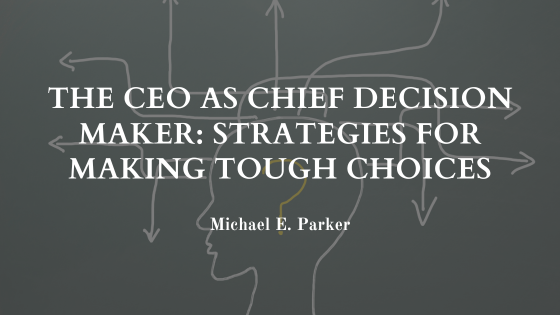In the dynamic landscape of business, CEOs are not merely figureheads; they are the primary architects of their company’s fate. At the helm, they bear the weight of crucial decisions that can steer their organizations toward success or failure. Being the chief decision-maker is a role of immense responsibility, especially when faced with tough choices that can make or break the company. So, what strategies can CEOs employ to navigate these challenging waters effectively?
First and foremost, effective decision-making begins with a solid understanding of the company’s vision, mission, and values. These serve as guiding principles that anchor decisions and ensure they align with the organization’s overarching goals. By staying true to these principles, CEOs can make tough choices that are consistent with the company’s identity and long-term objectives.
Furthermore, gathering comprehensive data and insights is essential for informed decision-making. CEOs should leverage data analytics, market research, and industry trends to assess the potential outcomes of their choices accurately. By relying on evidence rather than gut feelings, they can minimize risks and increase the likelihood of successful outcomes.
In addition to data-driven approaches, seeking diverse perspectives can enhance the quality of decisions. Surrounding oneself with a team of experienced advisors, board members, and subject matter experts fosters a culture of collaboration and innovation. By encouraging constructive debate and dissenting opinions, CEOs can uncover blind spots and consider alternative viewpoints before making tough choices.
However, even with the best information and advice, CEOs must ultimately trust their instincts and take decisive action. Procrastination or indecision can be detrimental in fast-paced business environments, where opportunities are fleeting and competitors are relentless. By embracing calculated risks and displaying confidence in their decisions, CEOs can inspire trust and rally their teams behind a common purpose.
Moreover, effective communication is paramount when making tough choices. CEOs must be transparent about the reasoning behind their decisions and the potential implications for stakeholders. Clear and open communication fosters trust, mitigates resistance and encourages buy-in from employees, customers, and investors alike.
Furthermore, CEOs should not shy away from seeking feedback and evaluating the outcomes of their decisions. Reflecting on successes and failures allows them to refine their decision-making processes continuously. By fostering a culture of learning and adaptability, CEOs can position their organizations for sustained growth and resilience in the face of adversity.
The role of the CEO as the chief decision-maker is pivotal in shaping the destiny of a company. To navigate the complexities of tough choices, CEOs must adhere to their organization’s values, leverage data-driven insights, seek diverse perspectives, trust their instincts, communicate effectively, and embrace a culture of continuous learning. By mastering these strategies, CEOs can steer their organizations toward success and ensure a prosperous future in an ever-evolving business landscape.
